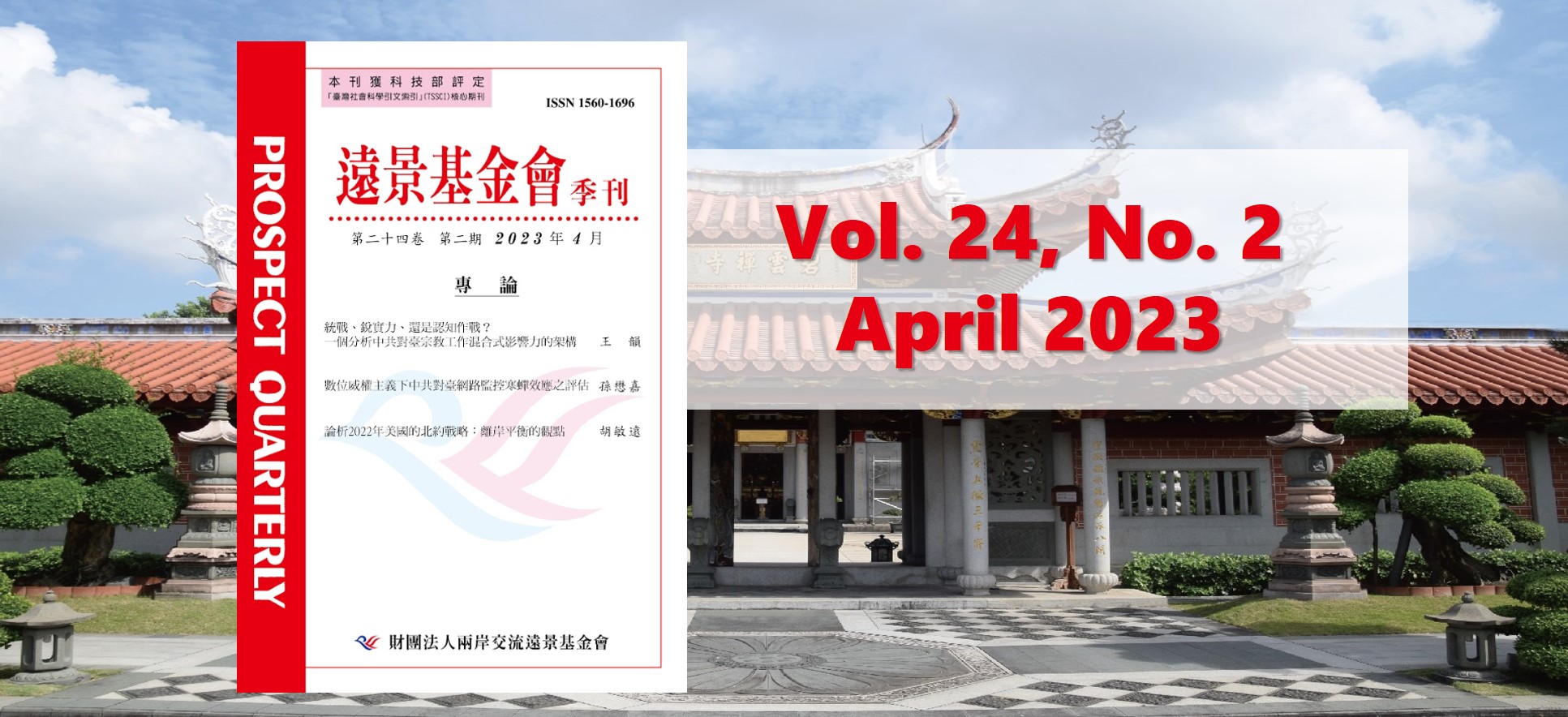Prospect Quarterly 24-2
Soft Power, Sharp Power or Cognitive Warfare?
A Hybrid Influence Analytical Framework on Chinese Religious United Front in Taiwan
Ray Wang
(Associate Professor, Graduate Institute of East Asian Studies, National Chengchi University)
Abstract
Civil society exchanges are growing rapidly and are the most stable dimension of cross-Strait relations. They currently play a role in sustaining an uneasy peace across the Strait, but China is alarmed by the possible “peaceful transformation” of these activities, and Taiwan is troubled by the “united front” problem that comes with these types of relations. Among all, religious exchanges have caused the most heated debate in Taiwanese society. While supporters believe they represent the benefits of civil liberties and the soft power of Taiwanese society to influence China, critics argue that these activities are embedded with Chinese “united front,” “sharp power” or “cognitive warfare” operations, because some religious organizations play the role of “Chinese agents” to influence public opinion, elections, or government policies in Taiwan. This paper compares the definitions, measurements, and strengths and weaknesses from three groups covered in the literature, and uses the knowledge to reexamine the current findings of cross-Strait religious exchanges. The author proposes a new “hybrid influence analysis” to address the overlooked fact that authoritarian regimes often mix and combine these tools in their influence operations. This new approach could generate more comprehensive academic research, more thoughtful public conversations and hopefully serve as a reference for policy discussion in the future.
Keywords: United Front, Sharp Power, Cognitive Warfare, Cross-Strait Relations, Cross-Strait Religious Exchange
The Chilling Effects of Online Surveillance under China’s Digital Authoritarianism: An Assessment
Mao-chia Sun
(Assistant Professor, Department of Journalism,
National Defense University)
Abstract
This study investigates whether China’s monitoring of activities on Taiwan’s Internet and social media may have a chilling effect (e.g., unwillingness to discuss China’s sensitive political issues and willingness to self-censor) among the Taiwanese. Using an online experiment that primes participants (N = 294) of China’s online surveillance, this study found that on China’s Internet and social media platforms, when having better online privacy skills, people who were cognizant of China’s online surveillance were more willing to search for and discuss China’s sensitive political issues than those who were not. People with higher level of online privacy concerns tended to be willing to self-censor when facing China’s online monitoring. In other words, variations in intensity of China’s online surveillance’ chilling effects depends on how much people perceive China’s online surveillance and care about their online privacy.
Keywords: Online Surveillance, Chilling Effect, Self-Censorship, Online Privacy Skills, Online Privacy Concerns
On the US NATO Strategy in 2022:
A Perspective on Offshore Balancing
Ming-yuan Hu
(Associate Professor-level Professional Technician,
Graduate Institute of Strategic Studies,
National Defense University)
Abstract
The United States is the most important leader within NATO. NATO develops a new strategy every 10 years. The United States’ strategy focuses on two main things: Russia and China. It regards Russia as the direct and most obvious threat, while China is classified as a challenge to the system. The United States’ strategy is based on the principle of offensive realism and offshore balancing, using NATO as a proxy to take military measures to sanction Russia in response to the threat it poses to the European continent. In response to China’s global challenges, the United States intends to build a global preventive system to contain its rise. However, the United States’ national strength is ostensibly declining, and the use of offshore balancing strategies cannot only consider the effectiveness of proxies from the military level, but should also consider geopolitics and the intentions of proxies.
Keywords: NATO, Offshore Balancing, Great Power Competition, United States, China




